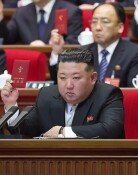[Editorial] Fete for railway restoration on Black Monday
[Editorial] Fete for railway restoration on Black Monday
Posted September. 18, 2000 20:44,
Splendor and the hustle-bustle of holding the ground-breaking ceremony Monday for the restoration of the severed Gyeongui railway were sharply contrasted with a collective public sigh lamenting the nose-diving share prices on the Korea Stock Exchange. The price index at the Korea Stock Exchange plummeted to 570. Worse still, the KOSDAQ index dipped below 90, which is widely regarded as a psychological, marginal line to back up the prices. It reminded us of the thought that another foreign exchange crisis may be in the offing.
Soaring crude oil prices and the Ford Motor Company's renunciation of its bid for the sale of the insolvent Daewoo Motor were the direct causes for the plummeting prices of stocks and shares. But, we think that the present bear market has a deeper cause for price nose-diving. The fluctuations of share prices at securities and stocks markets are like a comprehensive transcript reflecting not just business performances of corporations but also overall factors of social atmosphere and popular sentiment.
Such factors, to name just a few here, include the parliamentary deadlock despite many pending bills relating to grass-roots daily living, economic and inter-Korean issues; ill-prepared, forceful implementation of the new system to separate professional roles of doctors from pharmacists that has caused enormous suffering and anxiety for the people; and distrustful results of the prosecutors' investigations into Hanvit Bank's unlawful loans and the exercise of external pressures for loan guarantee over the Korea Credit Guarantee Funds.
Such a deplorable state of affairs notwithstanding, President Kim Dae-Jung regretfully appears to fail to understand the worsening popular sentiments and discontent. Plunging stock prices were inevitable and natural in view of such adverse political and economic factors combined with the shocks of oil prices soaring, exogenous to the domestic market environment.
The stocks and shares market is bound to turn weak and bearish if the people cannot trust the government's economic policies or have certainty about their future. The nose-diving stock market is a serious concern for us, because our economy was activated through vigorous capital markets, the nucleus of which is represented by the stock market. The plummeting stock market, therefore, can have a chain effect to cause a vicious economic spiral. What worries us even right this moment is the flight of foreign capital, which is already causing drastic depreciation of the won¡¯s value and an interest rate increase.
Many people both in the academic and media community have repeatedly warned that corporate and financial restructuring will become difficult if circumstances get worse to approximate the present, hard situations. But those people responsible for the formulation of policies turned a deaf ear to such a warning. One of such examples was the fact that readiness and alertness of our major economic actors was visibly slackened after the official declaration that our foreign exchange crisis was over.
The administration does not have enough time to hesitate in taking the right action to address the sagging economy. We realize that inter-Korean issues are important, but it will be impossible for us to provide economic aid to the North if we become short of economic power to spare. Long-term policies, instead of short-term measures, to strengthen the fundamentals for economy and stock market appear imperative, which will require restructuring and reform as its key regimen. At the same time, we should point out here that the ruling party and the Kim administration must be held accountable if their failures to address political instability turn out to be responsible for our sagging economy.







